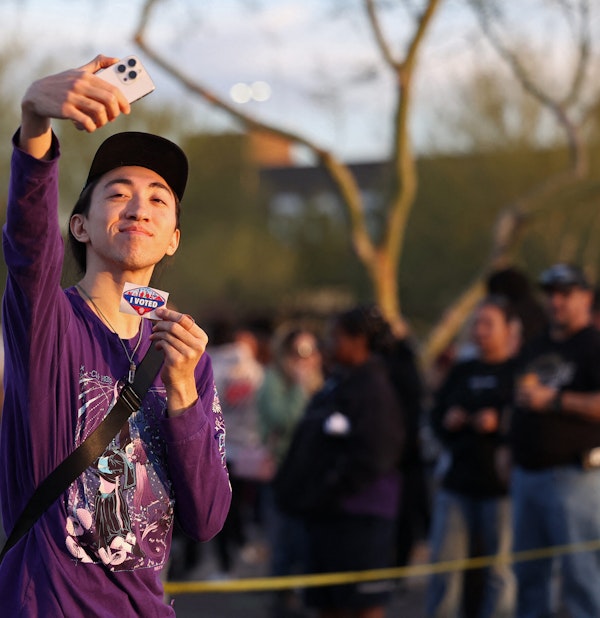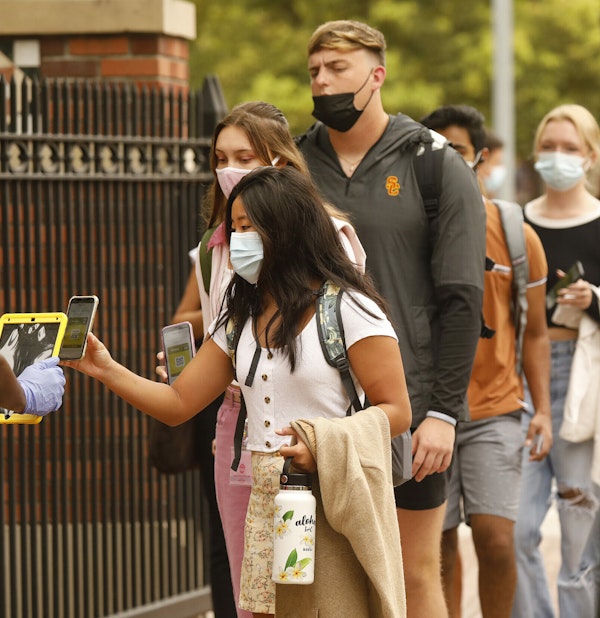How the Right got its groove back
Young voters are embracing the Republican Party. But the GOP must adapt if it hopes to keep them.
 A young voter takes a selfie on Election Day in Las Vegas, Nevada on Nov. 5, 2024. (Ronda Churchill / AFP via Getty Images)
A young voter takes a selfie on Election Day in Las Vegas, Nevada on Nov. 5, 2024. (Ronda Churchill / AFP via Getty Images)
After nearly two decades in the wilderness, conservatives have started to feel cool again. As progressives try to avoid being “cringe” or – even worse, irrelevant – the Right has begun to enjoy a new popularity among young Americans.
Not long ago, the situation was reversed. When Republicans lost the 2008 election to President Barack Obama – who at the time seemed to herald a new millennial-style pragmatic progressive approach – conservatives found themselves struggling to appeal to the next generation. In election after election, millennial voters (Americans born in the 1980s and early 1990s) broke for Democratic candidates. In poll after poll, millennial voters endorsed center-left positions.
Even as they aged, millennials seemed to be maintaining their distance from the conservative movement. The longstanding pattern, in which young people naturally shifted Right as they grew older, was not playing out with them. In 2015, I published a book – The Selfie Vote: Where Millennials Are Leading America (And How Republicans Can Keep Up) – that examined the disconnect between my generation and the Right, and what might be done to fix it. I recommended using technology to meet young people where they are, bringing technological smarts to government problems, and recognizing that old-style social conservatism plus pure devotion to free markets were a tough combination with which to woo young people.
Ten years later, the conservative movement has dramatically improved in its use of technology, developing its own ecosystem of influential voices who connect directly with audiences of all ages while increasing its use of targeted social media content to spread its message. The application of a tech-world problem-solving style to government has also shifted from a techno-optimist goal, as prevailed during the Obama years, to a Right-coded approach for taking on the administrative state.
Electorally, Republicans performed better with young voters in 2024 than in any presidential election since 2004; President Donald Trump lost voters under 30 by only 11 points. The generation gap, which had become cavernous during the 2010s, shrank significantly.
But the young Americans who voted in the 2024 election were not, of course, the same people who were young voters in earlier elections. In the 10 years since I wrote my book about millennials, we have (much as it pains me to admit it) aged out of our status as America’s youth. The oldest edge of my generation is now thoroughly ensconced in middle age. Generation Z – Americans born in the late 1990s and 2000s – has taken our place as the object of generational fascination.
And while Republicans have improved their electoral performance with Gen Z, that doesn’t mean that whole generation has become more conservative – at least not in the way that conservatives of the post-World War II era might understand the term. Americans under the age of 30 are less favorable toward capitalism, more likely to embrace LGBT rights, and are the least likely of all age groups to think that the United States is exceptional or should take an active part in world affairs. There are also major differences between politics embraced by the male and female members of this generation.
All of which raises two important questions. First, while Gen Z may have voted for President Trump in surprisingly large numbers, is it actually conservative in a traditional sense? And second, what can conservatism offer a generation that may be open to the Right – but is not necessarily sold on a traditionally conservative worldview?
 Students at the University of Southern California checking in via iPad as they return to in-person classes in Los Angeles, California on Aug. 23, 2021. (Al Seib / Los Angeles Times via Getty Images).
Students at the University of Southern California checking in via iPad as they return to in-person classes in Los Angeles, California on Aug. 23, 2021. (Al Seib / Los Angeles Times via Getty Images).
Raised in chaos
To better understand these questions, it is valuable to consider the unique ways in which members of Gen Z experienced the world during their formative years, namely their adolescence and early adulthood. From the first election of President Trump, to the Black Lives Matter protests and the ensuing backlash, to the rise of cancel culture across a range of institutions, Gen Z has been steeped in combative politics from day one.
On top of that, the COVID-19 pandemic was a massively disruptive event that played a significant role in Gen Z’s political orientation. As The Atlantic’s Derek Thompson has written, “New ideologies are messy to describe and messier still to name. But in a few years, what we’ve grown accustomed to calling Generation Z may reveal itself to contain a subgroup: Generation C, COVID-affected and, for now, strikingly conservative.” As Thompson notes, the pandemic both shattered this subgroup’s fragile trust in a wide range of institutions and prevented the sort of in-person social interactions that might otherwise have reduced divisive and distrustful impulses. As one of my favorite experts on Gen Z, the consultant Rachel Janfaza, has noted,“COVID-19 upended all of our lives, shattered norms and altered the course of history. It also bifurcated Generation Z,” splitting her generation on the basis of what stage in life people found themselves in when the world shut down.
But Gen Z has been affected by more than the big, headline-making events. As Daniel Cox of the American Enterprise Institute’s Survey Center on American Life has shown, “routine patterns of behavior, norms, and beliefs established in childhood [also] exert considerable influence over our adult lives.” Cox has found that Gen Z is less likely to report engaging in a number of activities, positive and negative, that were common among older generations when they were teens. These include drinking and smoking, but also having a part time job or a boyfriend or girlfriend. Gen Z is also less likely to report regularly having dinner with family and are more likely to report often feeling “isolated or lonely.” Given that most of today’s teens describe themselves as “almost constantly online,” there’s also plenty of evidence (no surprise) that the omnipresence of screens and social media are having a huge impact on younger Americans’ experience of the world.
Thompson identifies this trend toward living online as an especially potent driver of Gen Z’s rightward shift – at least among men. “By trading gender-blended hangouts in basements and restaurants for gender-segregated online spaces, young men’s politics became more distinctly pro-male,” he writes. Meanwhile, the evidence also shows that young women – who also now tend to occupy more women-focused spaces online – have shifted even more dramatically, but in the opposite direction. Gallup polls show that young women have moved sharply leftward over the last decade relative to young women of the past.
Because both sexes have grown up more connected online but less connected to others in the real world, both male and female members of Gen Z share a distrust of other people and of major institutions and ideas that were once commonplace in this country. While most members of Gen Z say they believe in the existence of an American dream and say they are proud to be an American, for example, they are the least likely of all U.S. generations to report such sentiments. As Janfaza writes, this “distrust, cynicism and a glib view of the future” is especially marked among the youngest half of Gen Z.
I see such sentiments bubble up in my poll findings. I find some of these results – such as having very little trust in Congress or the traditional news media – easy to understand and sympathize with. Others, however – like the whopping four-in-10 young adults who say they sympathize with the man accused of shooting a health care CEO in cold blood on a Manhattan sidewalk – I cannot fathom.
 A teenager reading alone on his smartphone late at night. (Thai Liang Lim / Getty Images)
A teenager reading alone on his smartphone late at night. (Thai Liang Lim / Getty Images)
Finding what’s been lost
In recent elections, Republicans have thrived by winning over larger shares of voters who hold such a jaundiced view of institutions, who think everything is rotten. That helps explain why the party has improved its performance among young voters, or at least is losing to the Democrats among this group by smaller margins. At the same time, however, there’s not much evidence suggesting that Gen Z has truly become more conservative in the classic sense. Edmund Burke’s children they are not. What then does a forward-looking conservatism have to say to a generation that is temperamentally anything but, that is more inclined toward populism and a burn-it-all-down worldview?
Today is arguably one of the best times to be alive on our planet. Yet the data paint a bleak picture about how Gen Z is experiencing life. Less than half of young Americans in this group thinks of themselves as “thriving,” and they are the generation least likely to rate their mental health highly.
Back in 2019, Eve Fairbanks, writing for the Huffington Post, described a rising interest in devout Catholicism among some of her peers from secular backgrounds. Fairbanks saw the “Make America Healthy Again” and “tradwife” trends fusing in some of these young women and leading them to the church. “These young women have one last surprise, she added. “They tend to be far more doctrinally conservative than their predecessors.” While on the whole young Americans are mostly moving away from religiosity, Fairbanks found, “it appears that young people who do seek religion are drawn to a stricter, more old-fashioned form of it.”
What is causing this embrace of old-school doctrine? In Fairbanks’ telling, younger Americans are finding it particularly hard to locate meaning and satisfaction in their lives. They have been set up to fail by the expectations the world places on them and by the expectations they place on themselves. These expectations lead to a constant sense that one never measures up, of never feeling fulfilled.
In my research, I’ve found that if there’s one thing millennials and Gen Z agree on, it is the idea that the 1990s were the peak time for American culture, quality of life, and values. (As an elder millennial, I endorse much of this view.) When I talk to younger adults about these issues, they’ll often speak nostalgically about an era before smartphones and social media became omnipresent. Not only are they bringing back wide-leg jeans, they also wish they had had the chance to experience a life that wasn’t lived online, when people felt more present with one another and when a satisfying life seemed more within reach.
When I wrote The Selfie Vote, I focused on policy areas where I thought the center-Right could create an agenda that would appeal to my generation. Ten years later, I think we should focus less on specific policies but rather on what problems we need to solve. What is the core problem of our modern life that we need to understand and to address?
I think that Gen Z – especially its male members – are seeking out conservatism because they believe that modern life is not delivering much of what had been promised to them. It is not offering meaning, connection, or the ability to feel respected and valued in a way that they believe past generations experienced. Yes, they crave economic opportunity and the ability to earn a good living – and conservatives should have policy answers for that. Yes, they crave physical safety and well-being – and conservatives should have policy answers for that too. But those problems don’t represent the whole story.
The millennial generation turned away from the Right during young adulthood. Gen Z is less convinced that the Right or the Left has all the answers. Conservatives must speak to this skepticism, acknowledging this generation’s fears also while speaking to their hopes. How can we make it possible for people to live lives that embrace family and community, that offer dignity, that ensure that people feel needed and valued for their work? If the Right hopes to truly reach Gen Z, the answers to such questions must be at the core of anything conservatives propose.
Conservatives have once again recaptured the attention of America’s young adults. That means that conservatives have an important opportunity to explain what it is we would seek to conserve. While always looking forward, we must have a vision for how we can revive the meaningful things this generation feels we have lost, and how we would support and strengthen the institutions – new and old – that can offer the meaning, connection, and value they seek.
The Catalyst believes that ideas matter. We aim to stimulate debate on the most important issues of the day, featuring a range of arguments that are constructive, high-minded, and share our core values of freedom, opportunity, accountability, and compassion. To that end, we seek out ideas that may challenge us, and the authors’ views presented here are their own; The Catalyst does not endorse any particular policy, politician, or party.

